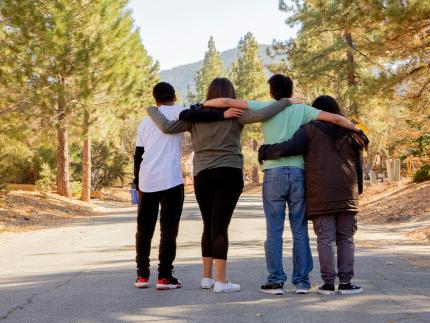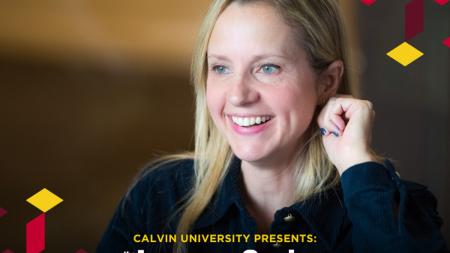Webinar Explores How Better to Support Youth

What does faith formation look like across someone’s lifespan—and how can the church walk with young people as they grow?
That was the focus of a recent webinar cohosted by Thrive and 1Life BC, an initiative of Classes B.C. North-West and B.C. South-East that provides learning and resources to area congregations and leaders. The event centered on the Spiritual
Characteristics of Children, Teens,
and Young Adults, a newly updated online resource designed by Thrive to help parents, caregivers, and ministry leaders understand how faith develops from infancy through young adulthood.
Liz Tolkamp, Canada West regional connector for Thrive and content curator at 1Life BC, hosted the webinar. Jill Benson, Dwell curriculum developer; Ron DeVries, Thrive’s youth and emerging adult ministry consultant; and Rick Zomer, Thrive’s faith formation consultant, presented on using the resource to help support children, youth, and young adults, respectively. Kim Rankens provided technical support for the 16 attendees from across Canada and the United States.
The webinar explored key takeaways from the resource and how it can benefit churches.
For Children
From infancy, children begin experiencing God through relationships, said Benson. She explained that this updated resource underscores how often we underestimate the spiritual depth of even the youngest kids. For example, children ages 5–6 are full of questions about the Bible—not because they’re doubting, Benson said, but because they’re curious and full of wonder. When adults welcome those questions without fear, it opens the door for a deep and resilient faith. As Benson noted, this reinforces just how important children’s ministry is—even starting in the nursery.
For Youth and Teens
Many young people make conscious commitments to Christ earlier than adults might expect—often between ages 9–14. Ron DeVries highlighted how eager today’s youth are to engage with the gospel and serve their communities. In one example, teens participating in local service through short-term missions asked deep questions about justice and what God is doing in the world. Their desire to be the hands and feet of Christ becomes a powerful invitation for adults to listen, learn, and lead alongside them.
Technology also plays a major role in the conversation, DeVries added. Youth today are immersed in digital spaces, and while some aspects of that can be distracting, these spaces can also offer faith-building opportunities—when adults are willing to walk with them and guide their spiritual journeys.
For Young Adults
Faith formation doesn’t end at high school graduation. Young adults go through seven major life transitions, and they need spiritual companions who will be present with them through both joy and struggle, Zomer explained. Saying “When I was your age . . .” isn’t helpful—it can feel dismissive. Instead, churches should show up, listen, and offer grace. According to Zomer, young adults who have someone in church who knows their story are 64 percent more likely to stay connected to their faith community.
During a Q&A session, Zomer added, “The best ability is availability.” Being present, even when things feel awkward, builds the kind of trust and connection that forms lasting faith.
Adapting in a Post-COVID World
Since the COVID-19 pandemic, noted the presenters, the shape of youth ministry has shifted. Digital programming took center stage during lockdowns, and though in-person gatherings have resumed, the landscape has changed. At the same time, social media continues to shape how young people form identity and explore faith. Ministry today must meet young people where they are—curious, connected, and craving community.
One big question that the webinar raised was How can we better support ministry with teens and young adults? Many churches have plenty of volunteers for nursery and children’s programs, but fewer step forward for youth and college-age ministries. The panel emphasized the importance of setting clear expectations, providing resources and relational support, and remembering that knowing a young person’s name is one of the simplest and most powerful forms of connection.
What Are You Most Curious About?
The webinar left many participants reflecting on their own experiences and wondering, How can we create space in our churches where kids and youth feel seen, known, and spiritually challenged? The curiosity and energy of young people is not a problem to manage—it’s a gift to nurture, the panel said. And the Spiritual Characteristics resource offers a valuable tool for doing just that.
To learn more and to access the full resource, visit the Network’s landing page, and take some time to reflect on Spiritual Characteristics of Children, Teens, and Young Adults.


